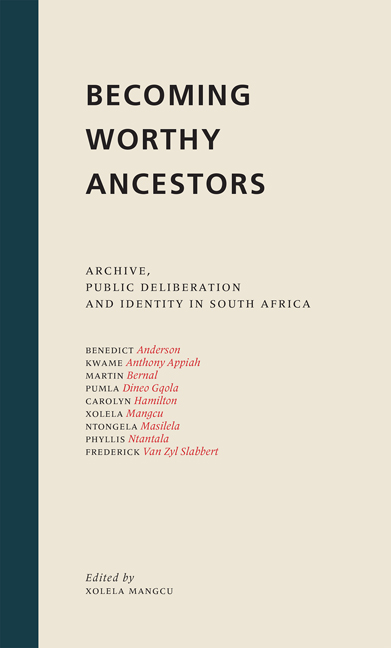Book contents
- Frontmatter
- Contents
- Preface
- Chapter One Evidentiary Genocide: Intersections of Race, Power and the Archive
- Chapter Two The Transmission Lines of the New African Movement
- Chapter Three Some Do Contest the Assertion That I Am An African
- Chapter Four Africa in Europe, Egypt in Greece
- Chapter Five Unconquered and Insubordinate: Embracing Black Feminist Intellectual Activist Legacies
- Chapter Six Identity, Politics and the Archive
- Chapter Seven The Goodness of Nations
- Chapter Eight Why Archive Matters: Archive, Public Deliberation and Citizenship
- Endnotes
- Index
Chapter Seven - The Goodness of Nations
Published online by Cambridge University Press: 21 March 2018
- Frontmatter
- Contents
- Preface
- Chapter One Evidentiary Genocide: Intersections of Race, Power and the Archive
- Chapter Two The Transmission Lines of the New African Movement
- Chapter Three Some Do Contest the Assertion That I Am An African
- Chapter Four Africa in Europe, Egypt in Greece
- Chapter Five Unconquered and Insubordinate: Embracing Black Feminist Intellectual Activist Legacies
- Chapter Six Identity, Politics and the Archive
- Chapter Seven The Goodness of Nations
- Chapter Eight Why Archive Matters: Archive, Public Deliberation and Citizenship
- Endnotes
- Index
Summary
THE ORIGINS OF NATIONALISM
South Africa is a good place to have a conversation about the goodness of the nation. If one looks at the immediate historical origins of nationalism, in the last quarter of the eighteenth century, one realises that it arose in the context of a wider popular involvement in projects of emancipation. Jefferson's famous Declaration of Independence speaks in the name of ‘The People’, but this people has as yet no name. The French Revolution had a huge impact in Europe, the Americas, the Caribbean, and later in Asia and Africa, precisely because of its universalist message, not its local ‘Frenchness’. In the nineteenth century, nationalism typically was found in popular movements against emperors, monarchs, and aristocracies, and nationalists in different regions regarded themselves as ‘brothers’ in a common struggle. The same was true for much of the decolonisation movements of the twentieth century. Nkrumah, Nehru, Tito, Touré, Sukarno and U Nu had all grown to manhood under imperial rule of different kinds, and felt their affinities keenly, even when they did not like each other much on a personal level. Only after the First World War, however, did the nation state become ‘normal’ across the globe with the initiation of the League of Nations.
At the same time, however, nationalism now has a long enough history for anyone to recognise its dark side. Almost all modern nations are divided along the lines of class, religious affinity, ethnicity, gender, ideology and generation. Many of them have behaved very badly at times, to their own members and to neighbours, and have fallen under the control of corrupt, cruel, and/or incompetent leaders. Why then do nations continue to have enormous emotional power, even in the age of globalisation? How can they still be felt as Good?
Some intellectuals have sought to explain this emotional hold by describing nationalism as a kind of secular religion, marked by the same unquestioning belief that the ‘religious religions’ often command. But this view is unsatisfactory, for nationalist belief is very different from religious belief. Nations want to be members of the United Nations, along with perhaps 200 others; they wish to be recognised and respected by ‘other nations’ which, like them, have a lot in common, in spite of local idiosyncracies.
- Type
- Chapter
- Information
- Becoming Worthy AncestorsArchive, Public Deliberation and Identity in South Africa, pp. 109 - 118Publisher: Wits University PressPrint publication year: 2011



